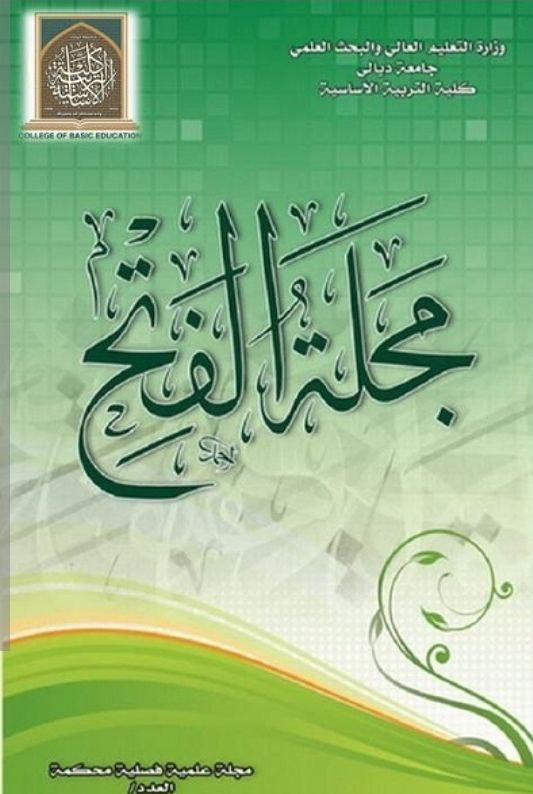العلاقة بين ثقة طلبة كلُة القانون بقدراتهم فٍي الكتابة في اللغة الانكليزيةوادائهم
الملخص
ليس هناك شك في أن الكتابة هي واحدة من أصعب المهارات لإتقان متعلمي اللغة الثانية ، على وجه الخصوص ، لطلاب كلية الحقوق الذين يتعلمون اللغة الإنجليزية لأغراض قانونية. إن اكتساب مهارات الكتابة شديدة التعقيد ليس العامل الوحيد الذي يجعل الطلاب يحققون النجاح في الكتابة. هناك عوامل أخرى تؤثر على نتائج الطلاب مثل الثقة في قدراتهم الخاصة المعروفة باسم معتقدات الكفاءة الذاتية. حظي بناء الكفاءة الذاتية باهتمام متزايد وثبت أن له علاقة إيجابية كبيرة بالإنجاز الكتابي. وبالتالي ، يُتوقع من الطلاب الذين يتمتعون بدرجة عالية من الكفاءة الذاتية في مهارات الكتابة الخاصة بهم ، أن ينجزوا مهام الكتابة بنجاح ، ومن ناحية أخرى ، من المتوقع أن يفشل أولئك الذين يظهرون انخفاض الكفاءة الذاتية حتى قبل أن يبدأوا في الكتابة. أهداف هذه الدراسة هي: 1. التحقق من الارتباط بين الكفاءة الذاتية لطلاب كلية الحقوق وتحصيلهم الكتابي في اللغة الإنجليزية. 2- التعرف على الفروق في الجنس بين طلاب وطالبات القانون من حيث الكفاءة الذاتية والتحصيل. 3. التعرف على أداء طلبة القانون في مقياس الكفاءة الذاتية.
المراجع
Bachman, L. & Palmer, A. (1996).Language Testing in
Practice: Designing and Developing Useful Language
Tests. Oxford: Oxford University Press.
Balci,A. (2013). A Study on Correlation Between SelfEfficacy Perceptions and Writing Skills of Students with
Turkish Ancestry and Foreign Students. Mustafa Kemal
University, Faculty of Education.
Bandura, A. (1994). Self-Efficacy, Encyclopedia of
Human Behavior ( vol. 4 pp.71-81). New York Academic
Press.
Broaddus,M. B. (2012).Students' Writing Self-Efficacy,
Motivation, and Experience: Predictors in Journalism.
Ph.D. Diss. University of Tennessee, Knoxville.
http://trace. Tennessee.edu/Utk-graddiss/1275
Brown,w. (1987). Principles of Language Learning and
Teaching. New Jersey: Prentice Hall.
Corder, S. (1993). Introducing Applied Linguistics.
London: Penguin Books.
Codruta, B. E.(2012). Teaching Legal English as a Second
Language. Christian University "Dimitrie Catemir".
Harmer, J. (2007). How to Teach English. Essex: Pearson
Education Limited.
Mills, S. (2010). Self-Efficacy for Writing. George Mason
University. Psych. 557.
Pajares, F. & Schunk, D. (2001). Self Beliefs and School
Success: Self-Concepts, and School Achievements.
London: Alex Publishing. (pp. 239-266).
Pajares, F. ; Hartely, J. & Valiante, G. (2001). Response
Format in Writing Self-Efficacy Assessment: Greater
Discrimination Increases Prediction. Measurement &
Evaluation in Counseling & Development, vol. 33, Issue
Al-Fath Journal …………………………………..…………..No.64.December 2015
/http.www.alfatehmag.uodiyala.edu.iq
-17-
Pajares, F. (2002). Self-Efficacy Beliefs in Academic
Context: An Outline. Emory University. http:// des.
Emory.edu/ mfp/effta/htm.
Pajares, F. (2003). Self-Efficacy Beliefs, Motivation and
Achievement in Writing : A Review of the Literature.
Georgia: Taylor & Francis.
Richards, J. & Renandya, W. (2002). Methodology in
Language Teaching. Cambridge: Cambridge University
Press.
Richards, J. & Schmidt, R. (2002). Longman Dictionary of
Language Teaching and Applied Linguistics. London:
Longman.
Schmidt, K. & Alexander, J. (2012). The Empirical
Development of an Instrument to Measure Writerly SelfEfficacy in Writing Centers. The Journal of Writing
Assessment, vol.5, Issue 1.
Shunk, D.(1985). Self-Efficacy and Classroom Learning.
Psychology in the Schools. Blackwell
http:// www3.interscience. wiley.com
التنزيلات
منشور
كيفية الاقتباس
إصدار
القسم
الرخصة
الحقوق الفكرية (c) 2023 مجلة الفتح للبحوث النفسية والتربوية

هذا العمل مرخص بموجب Creative Commons Attribution 4.0 International License.
حقوق النشر والترخيص
تطبق مجلة الفتح للبحوث التربوية والنفسية ترخيص CC BY (ترخيص Creative Commons Attribution 4.0 International). يسمح هذا الترخيص للمؤلفين بالاحتفاظ بملكية حقوق الطبع والنشر لأوراقهم. لكن هذا الترخيص يسمح لأي مستخدم بتنزيل المقالة وطباعتها واستخراجها وإعادة استخدامها وأرشفتها وتوزيعها ، طالما تم منح الائتمان المناسب للمؤلفين ومصدر العمل. يضمن الترخيص أن المقالة ستكون متاحة على نطاق واسع بقدر الإمكان وأن المقالة يمكن تضمينها في أي أرشيف علمي.
لمزيد من المعلومات، يرجى متابعة الرابط: https://creativecommons.org/licenses/by/4.0/.



